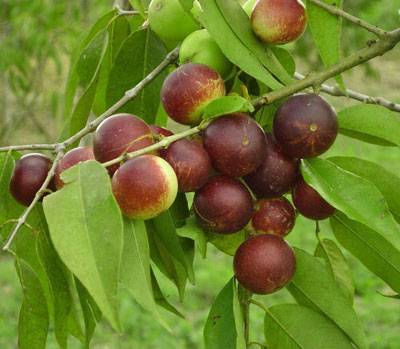|

by Michael Ravensthorpe
April 06, 2013
from
NaturalNews Website
Camu Camu, also called camocamo
and cacari, is a small tree that grows alongside rivers in
the central and western Amazon basin in South America.

It bears purple, cherry-sized berries
which, due to their extreme acidity, are typically sweetened into
jams, jellies, and juices rather than eaten raw.
The berries have
been utilized for medicinal purposes by Amazonian Indians for
centuries, and were often made into hair tonics.
Although they are not well-known fruits in the West, camu camu
berries rival some of the best fruits and vegetables in the
nutrition department.
Let's take a look at the benefits of
camu camu and find out why the reputation of this exotic superfruit
is ever-increasing.
Health
Benefits
-
High concentration of vitamin C
Studies show that camu camu
berries contain between a 2-3 percent concentration of
vitamin C (approximately 3000 milligrams per 100 grams of
pulp), which is the highest known of any fruit excluding the
Australian kakadu plum.
Indeed, it is this ultra-high
vitamin C content that gives the berry its sour taste.
Although vitamin C - also called ascorbate - is best-known
for its ability to strengthen the immune system, it also
supports the beneficial bacteria in our digestive tract and
helps to remove heavy metal particles from our system.
-
Anti-inflammatory properties
According to a 2008 study
published in the Journal of Cardiology, camu camu berry
extracts were shown to reduce the levels of oxidative stress
markers like urinary 8-hydroxy-deoxyguanosine, thereby
improving the inflammation and oxidative stress levels of
the participants.
Since chronic inflammation can
lead to a number of serious diseases such as rheumatoid
arthritis and even cancer, it is important that we
incorporate more antioxidant-rich fruits like camu camu into
our diets as a preventative measure.
-
Diabetes prevention
According to a 2010 study
published in the Journal of Agricultural and Food Chemistry,
camu camu berries contain high amounts of ellagic acid, a
flavonoid that is proven to contain anti-diabetic effects.
This fact, coupled with the
fruit's low glycemic index score (meaning it has little
effect on blood sugar levels), makes camu camu a safe and
even desirable fruit for diabetic and pre-diabetic
individuals.
-
Rich in flavonoids
Aside from ellagic acid, camu
camu berries also contain high amounts of other flavonoids
including catechins, rutin, anthocyanins, flavonols,
flavanols, delphinidin 3-glucoside, and cyanidin
3-glucoside.
Like vitamin C, flavonoids (of
which there are over 4,000 known to science) are
antioxidants that scavenge cell-damaging free radicals and
metallic ions, thereby providing us with anti-aging
benefits, memory-enhancing properties, and a lowered risk of
cancer, asthma, heart disease, and strokes.
-
Weight loss properties
Like most fruits, camu camu
berries are low in calories, rich in dietary fiber, and
contain almost no fat. Consequently, you won't ever need to
worry about weight gain when eating camu camu products, and
they can be incorporated into a healthy eating plan.
Due to the sizable amounts of
natural energy they provide, camu camu berry products are
best consumed during breakfast or before a workout.
One-hundred grams of camu camu berries
also provide us with 1.55 grams of protein, various B-vitamins
(including B1, B2, and niacin), and trace minerals such as
potassium, calcium, phosphorous, and iron.
The fruit is also known to improve blood
circulation, lower blood pressure, and increase serotonin levels,
which in turn improves mood.
Sources
|


